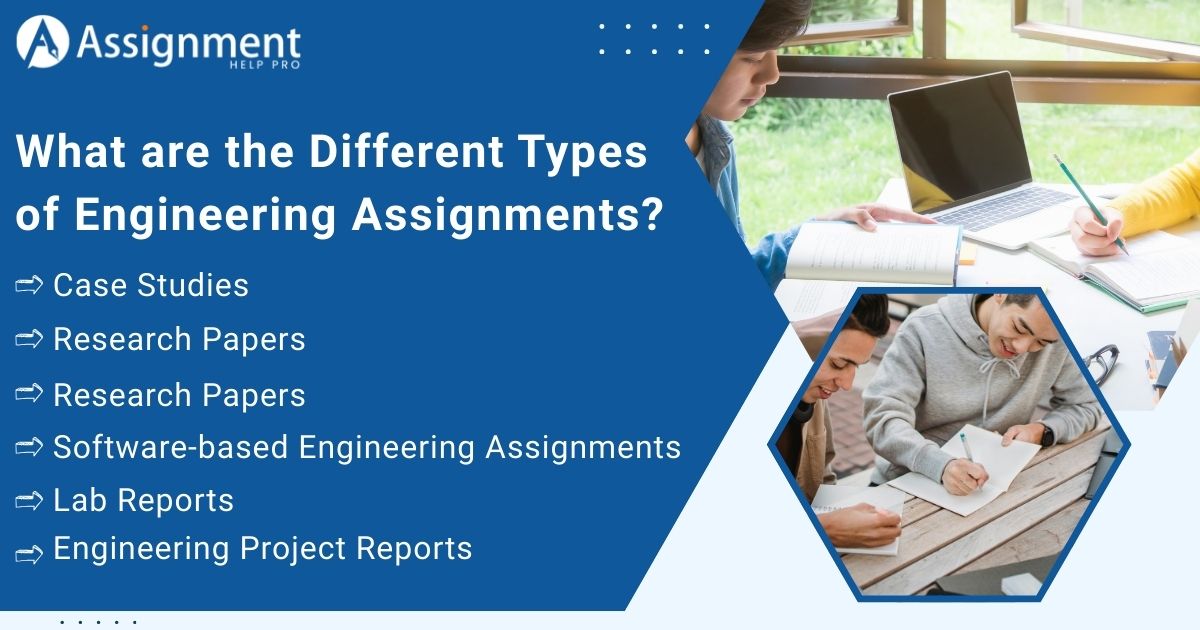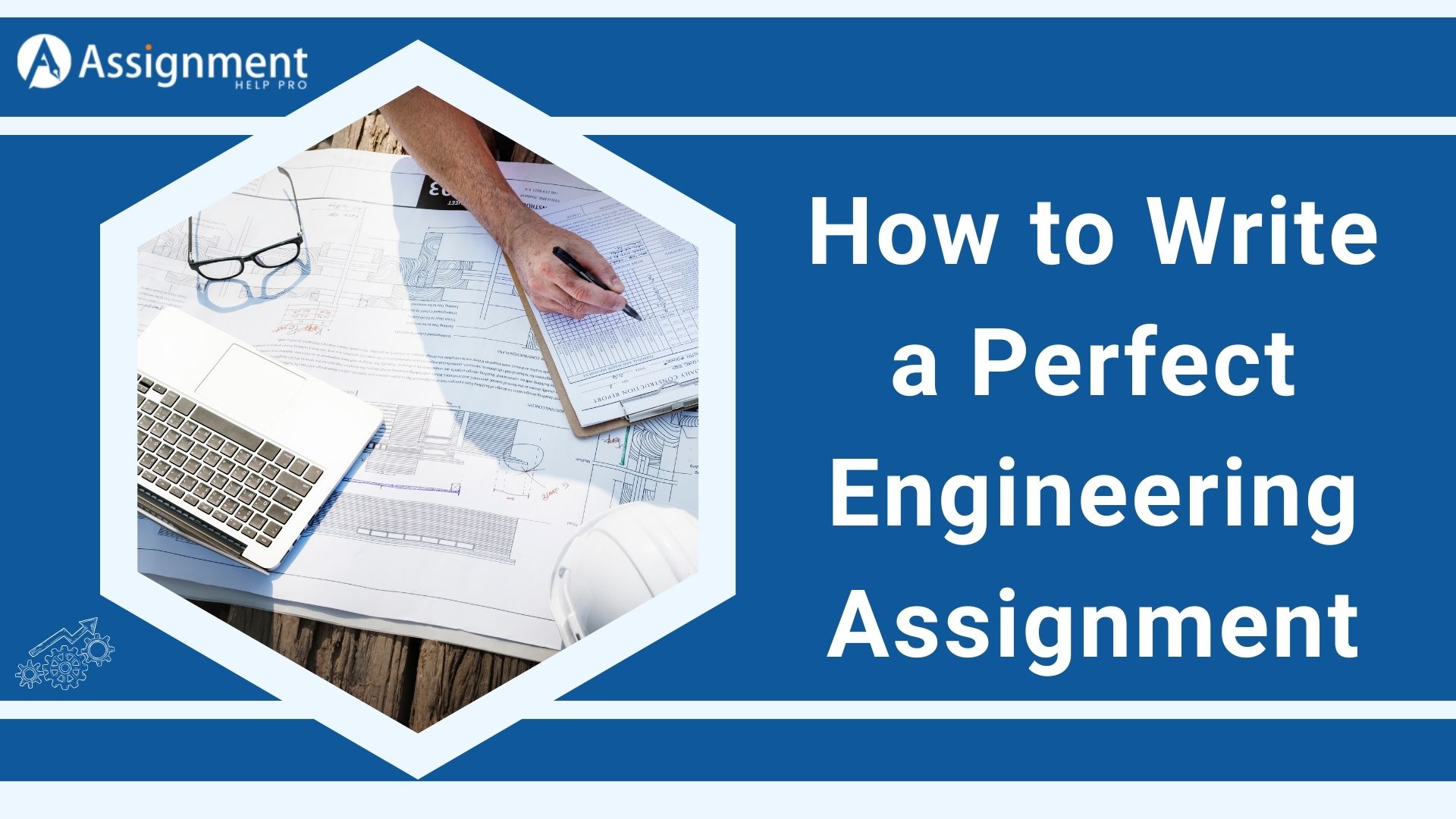Learning how to write an engineering assignment will give you more benefits. First, understand the objectives, research thoroughly, and structure your work perfectly. Next, proofread carefully to ensure accuracy. By following these steps, you can craft a flawless engineering assignment that showcases your technical expertise and earns top grades.
Engineering is a broad course that involves several complex topics. So, if you are an engineering student, then it might be challenging for you to write assignments on the concepts from the subject. Generally, to prepare high-quality engineering assignments, you must have good analytical skills, theoretical knowledge, and practical experience. Furthermore, when writing assignments on engineering topics, you will have to explain the points in detail with valid examples while maintaining high academic standards. In case you are unsure how to write a great engineering assignment, read this blog. Here, we have explained the different types of engineering assignments and also shared some valuable tips for writing a perfect engineering assignment.
An Overview of Engineering Assignment
An Engineering assignment focuses on creating academic content for engineering subjects. It involves explaining technical concepts, analyzing data, and presenting findings in a clear and organized way. Engineering assignment writing is not like regular academic writing. To prepare engineering assignments, you should possess great problem-solving skills and clearly explain the approach and results by using calculations, diagrams, and technical references.
Typically, engineering assignments come in various forms, such as technical reports, case studies, lab reports, and research papers. Each assignment type has a specific writing format. So, you must understand what your instructor expects to see in your academic paper. If you wish to succeed in your academics, then you must make sure your engineering assignments are technically accurate, logically structured, and written clearly.
What are the Different Types of Engineering Assignments?
There are many different types of engineering assignments. Each type has its own goal and writing guidelines. Hence, it is important for you to understand these differences so you can approach your engineering assignments in the right way.
Case Studies
Engineering case studies are academic papers that examine real-world problems to understand what caused them, what effects they have, and how they can be solved. To prepare engineering case study assignments, you must have critical thinking skills and analyze existing solutions and different engineering methods. A good case study should provide background information, list out the problems, and examine how the solutions are used. Through case studies, you can share useful ideas and suggestions for making the system or process better for future challenges.
Research Papers
Research-based assignments involve an in-depth investigation of a topic, starting with gathering information from various sources. Next, you should come up with a guess, called a hypothesis, and test it by doing experiments or thinking through ideas. To write a good research paper, you need to understand the subject well, think carefully, and explain your findings clearly. A research paper typically includes sections like a literature review, methodology, results, and discussion, and cites credible sources to support the arguments. Through academic papers on engineering research topics, you can demonstrate your knowledge and skills in researching and presenting complex ideas.
Design Calculations
Engineers in various fields, such as mechanical, civil, and electrical, often work on complex assignments that involve designing, calculating, and assessing the feasibility of systems. These tasks require strong math skills and a solid understanding of key engineering principles. Also, you must be able to interpret technical information accurately. Specifically, when you evaluate the feasibility of a project, you should consider factors like cost, environmental impact, and safety. This, in turn, will help you determine whether a solution is practical and effective.
Software-based Engineering Assignments
In engineering, you often have assignments that involve software simulations and programming. Usually, subjects like computer science, electrical engineering, and mechanical engineering will ask you to create algorithms and test software. So, to do these tasks, you can use software tools like MATLAB, AutoCAD, and SolidWorks. These programs will help you design, simulate, and study complicated systems and processes. Moreover, by using these software tools, you can also build practical skills that are very important for your future engineering career.
Lab Reports
Lab reports are documents that describe the steps, observations, and results of engineering experiments. They require accurate recording of data and thoughtful analysis of the findings. These reports typically include tables of numbers, graphs, and mathematical calculations to present the results. Lab reports are essential in engineering because they help validate hypotheses, ensure experimental accuracy, and demonstrate how theoretical concepts work in practice. By documenting their experiments and results, you can share your findings and contribute to the development of new ideas and technologies.
Engineering Project Reports
Engineering projects are one of the best ways for you to show your skills. These projects involve coming up with an idea and then putting it into action. You also need to write a project report that explains the whole process. The report usually includes the goals, methods, design steps, test results, and suggestions for the future. By making a clear and organized report, you show that you can solve engineering problems and handle real-world challenges. This will help you build practical skills and prove your knowledge in engineering.
Learn How to Write an Accurate Engineering Assignment
If you want to write great engineering assignments, then combine your technical knowledge with clear and effective writing. Also, use a well-organized approach to produce quality work that highlights your understanding. In case you are unsure how to deal with it, follow these tips to write excellent engineering assignments.
1. Read the Assignment Requirements
Before you start writing your engineering assignment, carefully read and understand the objectives, structure, and expected outcomes. Also, identify the main questions and clear up any confusion early on. Most importantly, review the marking rubric. This will help you understand what your instructor is looking for and ensure you are on the right track and meet the requirements.
2. Conduct Research
Next, perform extensive research on your engineering assignment topic by using trustworthy sources such as academic journals, textbooks, and technical papers. You can make your research more accurate and relevant when you keep up with recent technological advancements. Also, using a variety of sources will help you create a deeper analysis.
3. Write the Assignment
After conducting research, synthesize the findings and compose your engineering project. A well-structured assignment promotes readability and clarity. Typically, it should have a title page that includes the title, student information, and submission date. Next, it should include an abstract that summarizes the assignment’s objectives, approach, and major findings.
Next, include the introduction, body, and conclusion sections. In the introduction, you should provide background information, declare the purpose, and outline the scope. In the main body, provide analysis, calculations, and discussions. Finally, summarize the important findings and include a references list that cites sources in the appropriate format.
4. Add Examples, Images, and Diagrams
If you want to make your engineering assignment more interesting and showcase your subject understanding, then include real-world examples and case studies. You can also use visual aids such as diagrams, flowcharts, and tables to clearly explain complex ideas and strengthen your arguments.
5. Proofread and Edit
Before you submit your engineering assignment, proofread your work carefully. Specifically, look for grammatical errors, clarity, and technical accuracy. Also, get feedback from your classmates or instructors to make useful improvements.
Wrapping Up
Hopefully, by now, you will have gained a better comprehension of how to write an engineering assignment. Whenever you prepare the engineering assignment, make sure it is accurate and logically structured. If it is challenging for you to prepare it, get our engineering assignment help online. As per your needs, the subject experts from our team will assist you in completing all types of engineering assignments before the deadline. Moreover, with their guidance, you can also improve your subject knowledge and secure top grades.





